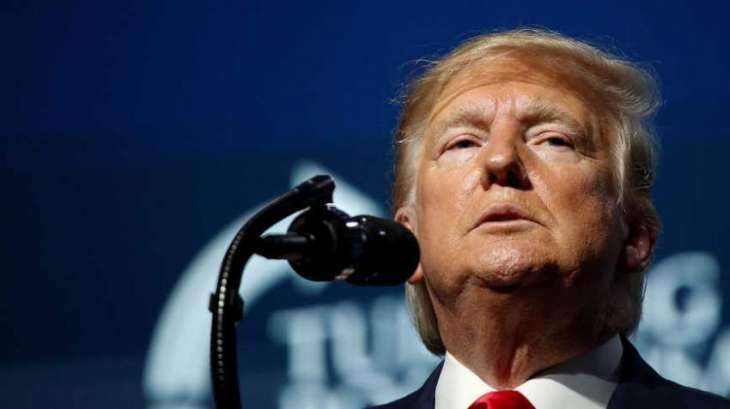The US Caesar Act, expected to enter into force next week and to impose new sanctions on the Syrian government, is lacking legal grounds and gives the US administration a new way to interfere in the Syrian domestic affairs, Syrian experts and politicians told Sputnik
MOSCOW (Pakistan Point News / Sputnik - 12th June, 2020) The US Caesar Act, expected to enter into force next week and to impose new sanctions on the Syrian government, is lacking legal grounds and gives the US administration a new way to interfere in the Syrian domestic affairs, Syrian experts and politicians told Sputnik.
US President Donald Trump signed into law the Caesar Act on December 20, 2019. The president will, no later than 180 days after the date of signing the bill into the law, issue regulations necessary for its implementation, the text of the act reads. It means that June 17 is the deadline for its coming into effect.
The "Caesar Syria Civilian Protection Act of 2019" requires the US administration to impose new sanctions on anyone who does business with or provides financing to the Syrian government including security services and the country's central bank.
"There is no justification in international law that gives legitimacy to separate US laws to take such measures toward Syria or other countries. It can be rather said that such US steps are a type of international blackmail based on force only to achieve its economic and political goals without any legal ground," Faek Hwajeh, a Syrian lawyer and the director of the Equal Citizenship Center, said.
Mahmoud Afandi, a Syrian politician, stressed that the United States was venturing into legal territory that should be governed by international law and not by US laws.
"This act was initiated in an illegal manner. Photographs showing alleged torture in Syrian prisons were smuggled to the United States from the Hague, and this is how the Act initiated and was introduced into the Congress in 2016. But actually this is not the United States who should deal with such matters, there is The International Court of Justice in The Hague for such issues," Afandi, the secretary of the Syrian opposition movement Popular Diplomacy, told Sputnik.
Some 50,000 photographs evidencing alleged torture in Syrian prisons were smuggled out of Syria by a former Syrian police photographer and defector under the pseudonym Caesar in 2015, after which Syrian-American advocacy groups spearheaded the law.
"This act opens the way for further US involvement in the Syrian domestic affairs," Afandi said.
On Monday, a bipartisan group of four lawmakers (House Foreign Affairs Committee Chairman Eliot L. Engel and Ranking Member Michael T. McCaul and Senate Foreign Relations Committee Chairman James Risch and Ranking Member Bob Menendez) called on the US administration to implement the sanctions package.
Apart from imposing new sanctions on anyone who does business with the Syrian government and the central bank, the Caesar Act calls for imposing sanctions on anyone who provides aircraft or spare parts to Syrian airlines or is involved with government-controlled construction and engineering projects.
"Undoubtedly, the Caesar Act will have a significant impact on Syria's economy because of the following reasons. First of all, the Syrian economy has become fragile after nine years of the war. Secondly, it has been tightened by sanctions imposed on companies, people and countries that have cooperation ties with Syria. In addition, it will have a negative physiological impact on the Syrian citizens," Hwajeh said.
The lawyer said that the act will block Syria's economy by preventing the central bank from entering the global financial market.
These circumstances could be one of the reasons why Syrian President Bashar Assad has reinforced his fight against corruption, according to Afandi.
"Russia has apparently pushed Syria to look for internal reserves in the current conditions. Therefore, Assad is trying now to get money by pressing on oligarchs with tax issue, like what is going on with his cousin now," Afandi said.
Last month, Rami Makhlouf, one of Syria's wealthiest businessmen, head of the country's largest telecommunication company Syriatel and cousin of Bashar Assad, complained on his Facebook page that the government had required from Syriatel an outstanding payment of additional taxes and said it was not in line with the terms of the contract between the company and the government and was not matching the company's income.
"Russia pushes the Syrian government to take effective steps in the fight against corruption, as well as pressures it to engage the community to confront the economic blockade by allowing people to express their opinions and civil society organizations to function," Hwajeh said.
The lawyer added that US sanctions also aim to curb Iran's influence in Syria.
"I think that the Syrian allies - Russia and Iran, in particular - they are mainly concerned with the issue to mitigate an impact of sanctions on Syria ... As for Iran, there is no doubt that sanctions imposed on the Syrian government, as well as the economic and military blockade, are mainly aimed at exerting pressure on Iran to push it out of Syria (and away from the borders with Israel)," Hwajeh continued.
The Syrian Ministry of Health said in a statement on Wednesday that sanctions imposed by the United States and the European Union undermine the Syrian leadership's capabilities in the coronavirus response as they make it difficult to respond to all medical challenges.
In late March, Russia put forward a draft declaration of the UN member states on solidarity in countering the spread of COVID-19. Among other things, the document insisted on the need to assist the most vulnerable nations, especially developing countries, and end trade wars and all sanctions adopted without a UN Security Council mandate to ensure access to food and medication. Twenty-eight other countries co-sponsored the resolution.
However, the United States, the European Union, the United Kingdom, Ukraine and Georgia blocked the Russian draft.




